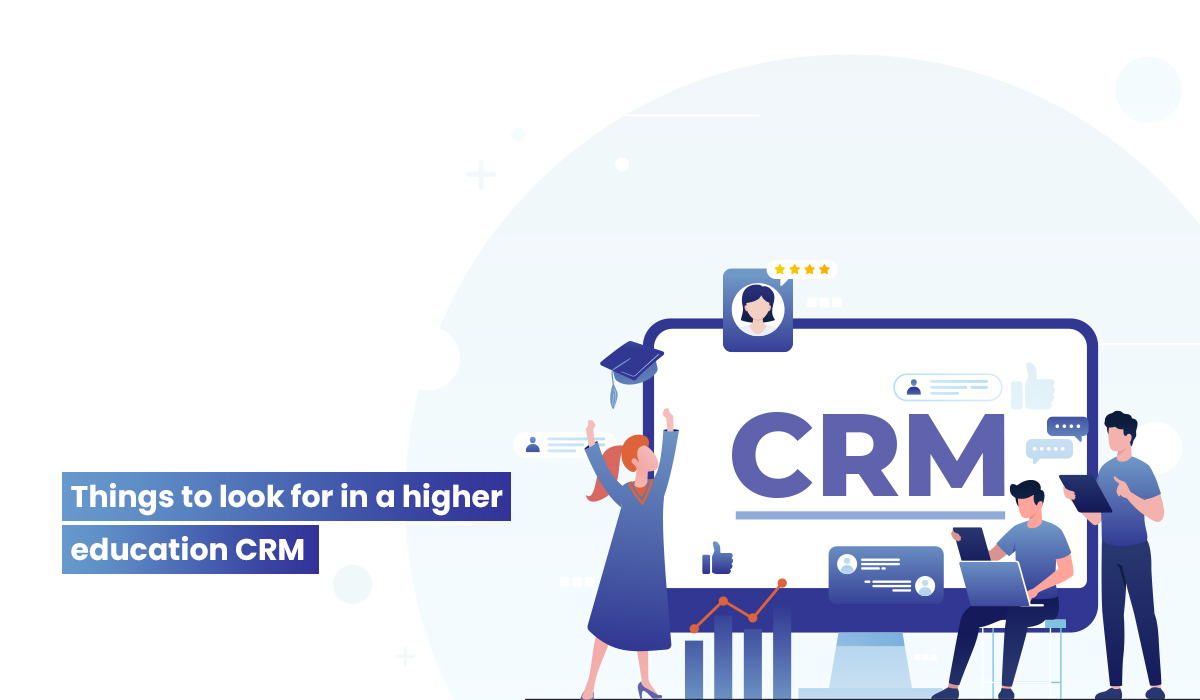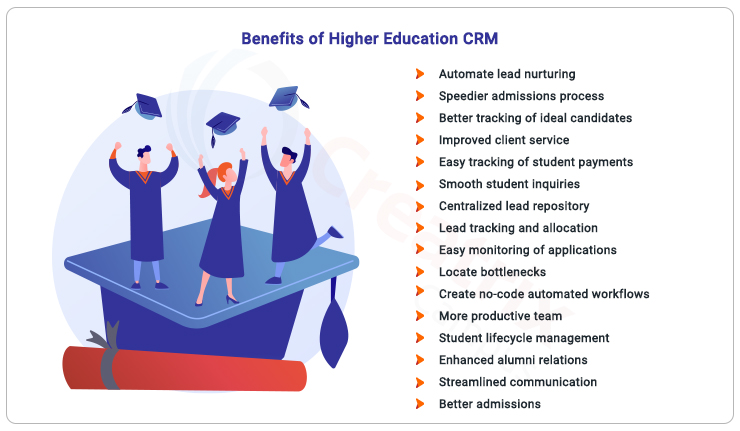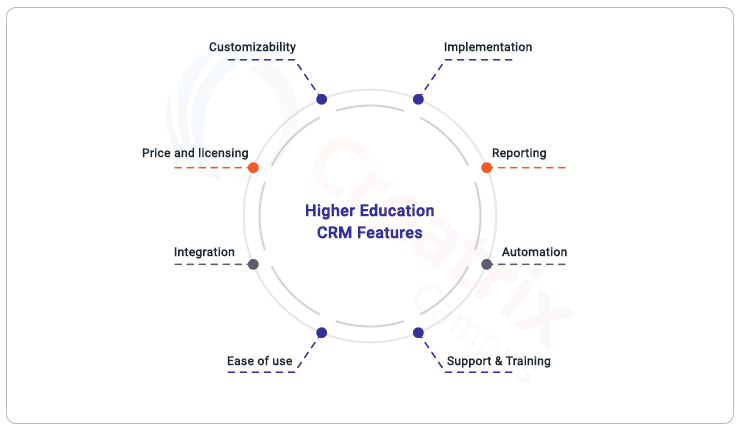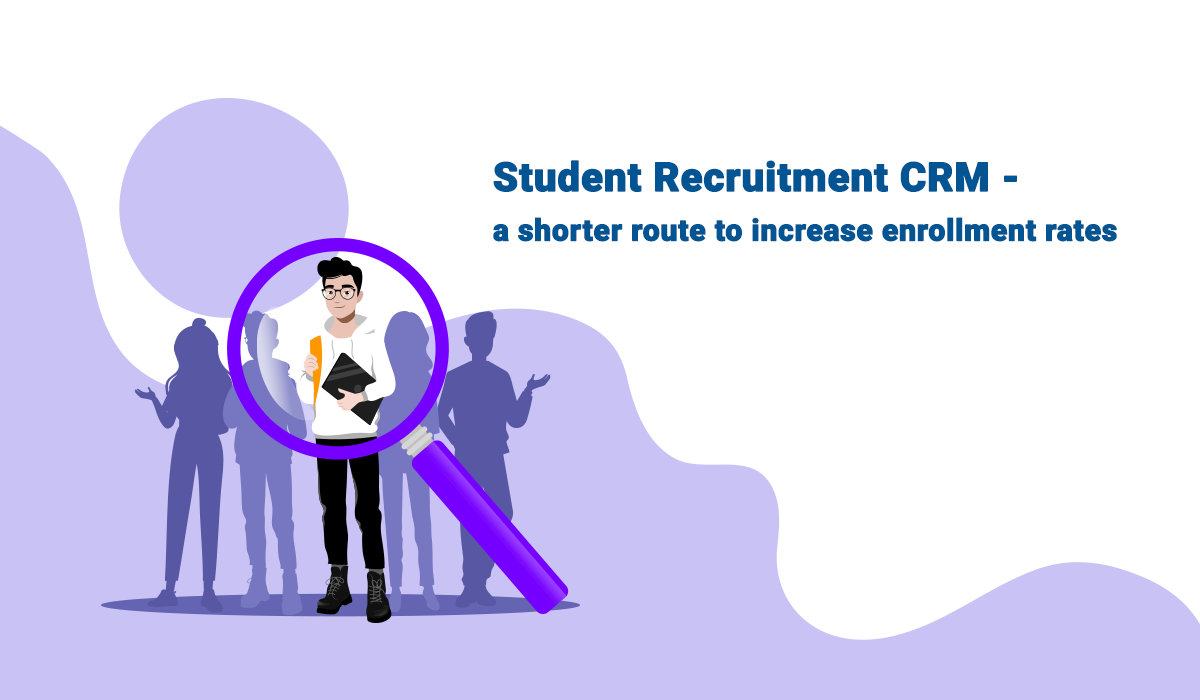What qualities to look for when purchasing Higher Education CRM?

Higher education CRMs can increase your enrollment, and boost conversion, graduation rates, and revenue. They are powerful tools that can streamline customer support, communication, and management.
Using the best CRM for higher education can help institutions overcome issues like disparate, outdated, or inaccurate data, lengthy tiresome processes, labor-intensive tasks, duplicate efforts, delayed information, and disconnected team members. But which one is good for your institution? What are the qualities to look for when purchasing a higher education CRM?
This blog will help you find the best CRM.
What is a Higher Education CRM?
First, let's break down the acronym:
CRM stands for customer relationship management. In the world of higher education, your customers are your students and they are literally your customers because they pay for your offerings.
The higher education CRM software enables colleges and universities to unify and manage all contacts, from prospective students to enrolled students to alumni and donors, thereby comprehensively understanding their constituents. They are frequently used to make critical touchpoints throughout the student lifecycle, from initial application to graduation.
A higher education CRM system also assists staff in improving internal and external communication. Because CRM data is accessible across departments, anyone who interacts with a student can view and record information about the student's overall journey.
What is the role of CRM in colleges and universities?
In short, a higher education CRM for universities basically serves the following purposes:
- Improves the process of evaluating and approving new college applications.
- Strengthens the bond between the institution and the student.
- It allows the admission committee to easily respond to inquiries in seconds and maintains contact with applicants through automated follow-ups and email campaigns, increasing your inquiry to applicant rates.
- Lets institutional heads track the most effective marketing campaigns in order to double down on productive channels and improve marketing ROI.
- Integrate with your student information system (SIS) to increase student engagement and take proactive steps to reduce attrition and increase graduation rates.
- Visualize the entire communication history with each student in order to create effective educational processes by utilizing the appropriate data and reporting tools.
Benefits of Admission CRM in Higher education

One of the most compelling reasons to implement a CRM is to centralize data and streamline internal collaboration. Admissions teams can manage inquiries and applicants more efficiently with an intuitive system and improved processes. Furthermore, because admissions and marketing departments have access to the same real-time data, they can collaborate strategically throughout the recruitment cycle.
Some of the main advantages of CRM software are the ability to
- Automate lead nurturing
- Speedier admissions process
- Better tracking of ideal candidates
- Improved client service
- Easy tracking of student payments
- Smooth student inquiries
- Centralized lead repository
- Lead tracking and allocation
- Easy monitoring of applications
- Locate bottlenecks
- Create no-code automated workflows
- More productive team
- Student lifecycle management
- Enhanced alumni relations
- Streamlined communication
- Better admissions
Yet another advantage of higher education CRM is that it can collaborate with other components of your marketing technology stack. When linked to a website personalization engine, for example, you can use prospect data from your CRM to tailor a specific user's experience the next time they visit your institution online. It can also play a critical role in student retention and alumni engagement.
Selecting the most appropriate Higher Education CRM for your college or university

A variety of factors must be considered when determining the best CRM for higher education for your institution. You should enter the research and selection phases with a list of requirements. Consider the following points:
Customization and flexibility options
Consider whether the CRM in question can perform all of your requirements. Will there be an additional charge if you need to customize certain elements? Meet up as a team and brainstorm on the following questions.
- Is it capable of doing what you require right out of the box, or will you need to customize any aspect of the system?
- If so, what are the associated costs?
- Is it something that your internal IT team can handle?
- Is it possible to brand prospect and student-facing elements such as an application portal or email templates?
It is critical that your IT team participate in these discussions, as much will depend on how much time they have and their level of expertise. One of the advantages of using a CRM is that the vendor can train your internal team on how to use it and notify you of any updates. It's also important that you can add your own branding to student-facing elements like the application portal and email templates.
Price and licensing
Find out how pricing works if the CRM is within your budget. Check to see if training and technical support are included in the price, as well as any contractual terms. Points for consideration here could be:
- Is it within your budget?
- What factors influence pricing? (some CRM may charge per student, while some others based on the features your institution may ask for)
- What are the contractual obligations?
Capabilities of integration with other platforms and tools
Determine whether the CRM will be able to integrate with your current technology stack. Will it, for example, integrate with your payment gateways and messaging services like existing SMSs, and student information systems (SIS)?
CRMs are usually very accommodating when it comes to third-party programs, but don't take it for granted; always double-check.
- You may also have to consider other things like
- Compatibility with mobile devices
- Safety features
- Observance of regulations and compliances
- Access and permission levels Scalability
Ease in utilization
Every platform is built uniquely. Some are extremely complex, while others are not. Some are more concerned with functionality, while others are concerned with usability. Therefore prioritize if you are unable to devote significant time to learning how the interface works, or if the software will be used by a variety of people in your organization.
Implementation timeline
Consider how each software provider's onboarding process differs and think of these questions:
- Will they assist you in getting set up, or will they leave you to it?
- Is there a fee for this support, if it is part of the total package?
- Do they provide a variety of resources, such as videos and written guides, to assist you in getting started?
Reporting functionality
The level of reporting varies depending on the CRM. Most platforms provide some level of analytics, but the extent to which they go varies by platform. The best CRMs enable you to build custom dashboards so that you can quickly access relevant information at any time.
You'd like to be able to report on the success of your marketing campaigns, student performance, and application evaluation processes.
Automation
CRMs of all types offer significant benefits in terms of automation.
In essence, it enables your team to complete manual tasks and communications automatically based on the instructions you provide. Each system's level of automation capability varies.
Therefore your priority should be to save a tonne of time by automating repetitive, manual tasks.
Support and Training
You require a dedicated support representative to contact if and when things go wrong, and/or you find it easier to solve technical issues by speaking with a live person rather than accessing support documentation. Also, think of questions like;
- What kind of assistance does the CRM service provider as part of your plan?
- Do you have a personal representative? Is support available around the clock?
- Is there a charge for assistance?
Best CRM for higher education implementation tips
Moving to automated software technology necessitates planning and strategy. 75 percent of new CRM projects fail due to insufficient planning. Plan ahead of time for implementation to assist users and stakeholders in achieving success.
Ensure buy-in at all levels: Make no assumptions about a new technological solution. Instead, include every staff whose job responsibilities may change or benefit as a result of the changes. Select only secure and compliant solutions: Privacy standards are critical when working with student data. Regulations such as FERPA also have an impact on how institutions interact with students and families, particularly through digital channels. Choose a CRM that meets these requirements.
Establish internal standards and procedures: Don't leave your customers in the dark. Take the time to define expectations, provide adequate training, and communicate regular or daily usage standards. These proactive steps can help each team and individual user reduces confusion and frustration.
Wrapping up
Whatever CRM platform or software your university selects, having a game plan is essential for long-term success. Customer relationship management is more than just a simple technological solution. A solid admission strategy can transform an institution's relationship with prospective applicants, current students, and alumni.
Schedule your free Creatrix Campus quick demo today.


